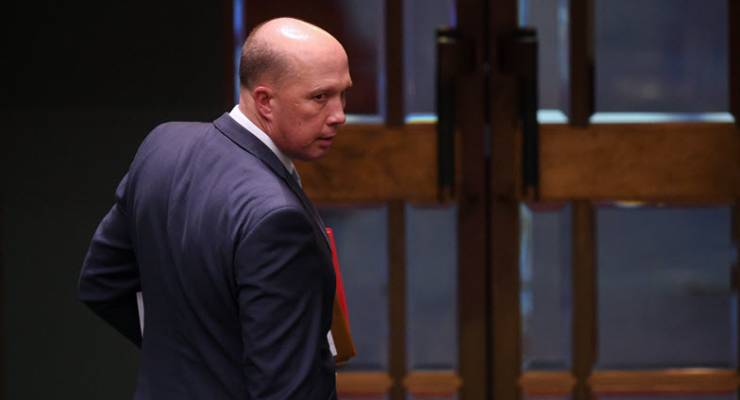
Immigration Minister Peter Dutton appears to treat the idea of judicial independence as an inconvenience. He routinely overturns decisions of courts, including most recently the High Court, when they review unfavourably decisions made by him or his Department of Immigration and Border Protection. So while Palestinian-born Krystal Trikilis is no doubt celebrating the fact that the Administrative Appeals Tribunal has overturned a decision by an official of the Immigration Department not to grant a visa to her 30-year-old Palestinian husband and father of their 2-year-old daughter, sadly this is not the end of the matter. This is despite the fact that the refusal to issue a partner’s visa in this case was done primarily on the basis of what is essentially a kangaroo court — the Israeli military court system.
The decision in Trikilis’ case by Deputy President James Constance was handed down on September 6. Trikilis’ husband, known in the decision as Mr Khalil, was refused a partner’s visa because the Immigration Department was of the view he did not pass the character test in the Migration Act. That test allows the department or the minister to refuse a visa if a person has acquired a substantial criminal record in any country.
What makes the Immigration Department’s original decision to refuse him a partner’s visa so problematic was that it did not rely on a civilian court finding against Mr Khalil but an Israeli military court decision of 2006. In Boxing Day of that year Mr Khalil “was convicted by the Military Court of Shomron of the offences of being a member of a hostile organisation and conspiracy to cause intentional death. The alleged conduct of which Mr Khalil was found guilty occurred when he was 19 years old,” the AAT decision noted. Mr Khalil was released after two years’ imprisonment. His explanation of the alleged offence was that he was at a friend’s wedding when, as is traditional, celebratory fireworks were let off. Israeli soldiers, thinking there was something sinister afoot, arrested Mr Khalil He denied any knowledge of leaks to terrorism or to being party to a “conspiracy of an attempted murder of an Israeli civilian”. Mr Khalil pleaded guilty under duress — he was subjected to torture. He was told by Israeli military officials if he did not plead guilty he would receive a term of imprisonment of eight years. The punishment he endured in his 34 months in prison was characterised by poor hygiene, starvation, humiliation and a refusal by prison officials to provide him with reading glasses.
[How Dutton is slowly undermining the rule of law in Australia]
One would have thought that even the most junior official in Dutton’s department would have seen the conviction of Mr Khalil as being, shall we say, unsafe. Constance certainly understood it as such and in his judgment he observed: “On the basis of the unchallenged evidence of Mr Khalil I am satisfied that he did not engage in improper conduct such as that alleged in the Israeli Military Court.”
And as to the Israeli Military Court system Constance said, even on the material provided to him by Dutton’s department, “there are widely held concerns as to the fairness of the procedures in the Military Courts. Further there were reports which provide some corroboration of his evidence as to the manner in which [Mr Khalil] was treated while in custody and of the circumstances leading up to his agreeing to the plea bargain put to the Judge.” It should be noted Constance was critical of Mr Khalil not revealing the military court conviction when he made his visa application.
[Peter Dutton cancels visa a third time, undermines the High Court in under an hour]
The AAT’s characterisation of the Israeli military court system as being deeply flawed when it is judged against principles of justice and fairness is not particularly controversial. Meredith McBride, writing in Haaretz on March 28 this year, noted that the “UN has repeatedly stated that the court acts in violation of international law. Military courts often lack the impartiality of civilian trials as the judge, prosecutor and translators are all members of the armed forces, rather than independent professionals hired by the state.” McBride is a journalist and now a law student at Fordham University in New York.
The conviction rate in Israeli military courts is almost 100%. On July 9 this year Human Rights Watch researcher Khulood Badawi wrote: “Military trials held by the Israeli army — a defining feature of the 50-year occupation — have a near 100-percent conviction rate and fall well short of any standards of justice.”
If Dutton, who has enormous powers under the Migration Act to override court decisions by simply finding a new basis for refusing a visa or for cancelling a visa, overturns the decision in Mr Khalil’s case then this will send a signal that the Turnbull government supports the notorious Israeli military justice system or that pressure from Israeli supporters and the Israeli government has been brought to bear on Dutton.








Crikey is committed to hosting lively discussions. Help us keep the conversation useful, interesting and welcoming. We aim to publish comments quickly in the interest of promoting robust conversation, but we’re a small team and we deploy filters to protect against legal risk. Occasionally your comment may be held up while we review, but we’re working as fast as we can to keep the conversation rolling.
The Crikey comment section is members-only content. Please subscribe to leave a comment.
The Crikey comment section is members-only content. Please login to leave a comment.